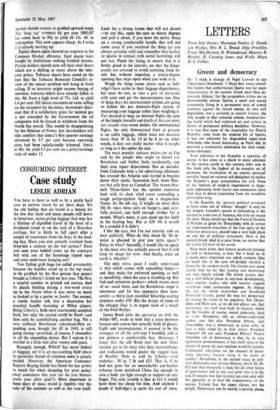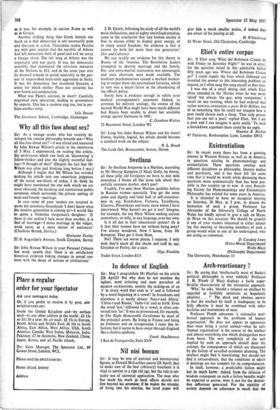Greece and democracy
LETTERS
From lolo Davies, Marianne Pu.cley, C. Good- son Wickes, Mrs R. L. broad. Olga Franklin, Frank Mac Derntot, H. Whitethread, Maurice B. Reckitt. D. Caradog Jones and Wolfe Mays, D. E. Folkes.
Sir: 1 think it strange of Nigel Lawson to say ('Spectator's Notebook.' 5 May) that 'every school-
boy knows that authoritarian Sparta was far more
representative of the ancient Greek ideal than de- mocratic Athens,' for the proposition strikes me as
demonstrably untrue. Sparta, a small and scared
community living in a permanent state of armed readiness against the feared enemy, its own serf population, was a curiosity in ancient Greece; the only people in that cultured, artistic, freedom-lov- ing world which had outlawed art and culture in favour of permanent military discipline. However, it is true that some of the inspiration for Plato's Republic came from the ordered life of Sparta; it was not unknown for disgruntled upper-class Athenians who hated democracy, as Plato did, to entertain a sentimental admiration for their totali- tarian adversary.
Your reference to the Republic is apposite, of course. It has come as a shock to some admirers of the ancient world in this century (who saw in this book only the highest of its complex set of purposes, the inculcation of an austere personal morality based on rational self-discipline) to realise
the Republic's great potentialities for evil. Some of the features of modern experiments in large- scale oppression, both fascist and communist, have been seen to derive inspiration from the would-be philosopher king.
Is the Republic the 'greatest political testament to have come out of Athens,' though? It may be
the longest. Lincoln's speech at Gettysburg is the
shortest to come out of America, but is by no means the least. Many would say that the Funeral Oration of Pericles as given by Thucydides, with its serene
yet impassioned evocation of the free spirit of the Athenian democracy, should take a very high place on any list of political testaments. Here is the ancient Greek ideal in a pure form; no matter that the reality fell short of the words.
Your main point, that Greece produced tyranny as well as democracy, is true; but it leads on to a much more important one which contains (like
so much else in the now oft-derided classics) a lesson for the modern world. The Greeks saw, more
clearly than we do, that tyranny and democracy
are very closely related. The Greek tyrants, dur- ing a well-defined phase in city-state development,
were popular leaders who with massive support overthrew older aristocratic regimes. At Athens the (on the whole benevolent and beneficial) Pisistratid tyranny paved the way for democracy
by raising the status of the populace. But Thucy- dides and Plato saw, as we do not always see, that
democracy can itself lead back to tyranny, which for the Greeks, of course, meant autocracy, kind or cruet. Hcrodotus, still an all-too-underrated author, saw this also. Periclean Athens, says Thucydides, was a democracy in name only; in fact, a state ruled by its first citizen. President Johnson? Or our own President Wilson? Plato's shrewdest cut at democracy is that, by its very egalitarian permissiveness, it lays itself open to the
seizure of power by unscrupulous would-be tyrants.
Communist take-overs via the channel of demo- cratic elections; fascism rising in the midst of apathy? Herodotus, in the earliest essay in poli- tical philosophy ever written (History, Book 111, 80- 82) says that monarchy is best, for all other forms of government will in any case grow into it in the end. It remains true that tyranny can exist only with the approval, or at least the acquiescence, of the masses. Tyrants fear the upper classes, not the people. Democracy can be merely a passing phase,
as it was, for example, in ancient Rome as well as in Greece.
Another striking thing that Greek history can teach us is that democracy is not necessarily pure and innocent in action. Thucydides makes Pericles say with grim realism that the republic of Athens had left memorials both of good and evil on many a foreign shore. The left wing at Athens was the imperialist and war party. It was the democratic assembly that sanctioned the atrocious massacre of the Melians in 415, and in the same year sent its doomed armada to perish miserably in the pur- suit of unprovoked imperialist aggression in Sicily. It was the democracy that murdered Socrates, a crime for which neither Plato nor posterity has ever found any condonation.
What was Plato's solution, in short? Carefully organised state education, leading to government by experts. This has a modern ring too, but is per- haps another story.
lolo Davies The Grammar School, Cowbridge, Glamorgan































 Previous page
Previous page